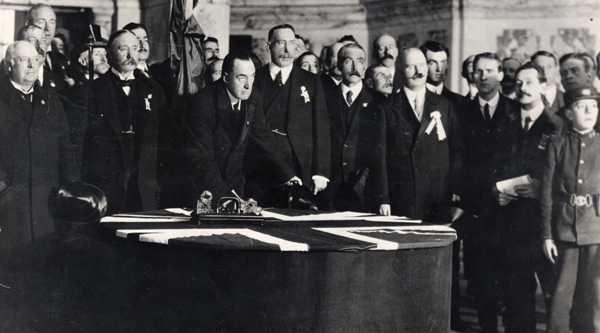The Home Rule Bill centenary
One hundred years ago, a third Home Rule Bill for Ireland was debated in Westminster. Its consequences are still felt. Stephen Dineen examines the debate’s content and context.
At 3.05pm on the afternoon of 11 April 1912, Herbert Henry Asquith introduced the Government of Ireland Bill to the House of Commons. The Prime Minister told the House that “amid all the varying phases and fields of our electoral and Parliamentary campaigns, one thing has remained constant, subject neither to eclipse nor wane.” This was “the insistence and persistence of the Irish demand.”
Asquith was quick to address unionist opposition to the Bill. “I have never spoken with disrespect of the motives of the strong and determined hostility which is felt to Home Rule by the majority in the north-eastern counties of Ulster.” He hoped to show that it had not been ignored in the Bill, but reiterated his view that “the right of a minority of the people … to veto the verdict of the vast body of their countrymen” would not be admitted.
The Prime Minister framed Irish devolution in terms of “the imperative need” for the “emancipation from local cares and local burdens of the Imperial Parliament.”
Safeguards, to appease unionist concerns, were outlined. The UK Parliament’s supreme authority would not be affected, religious freedom would be protected, and a nominated upper house (Senate) would provide an extra voice for unionists.
Asquith outlined how a British subsidy would continue to be paid to the Irish exchequer, and the Dublin Parliament’s powers of taxation. He warned that “if she [Ireland] spends more than comes to her in the manner I have described, she will have to find the money for herself.”
Carson
The Leader of the Conservatives, and the Opposition, Andrew Bonar Law, did not speak on the Bill until the second stage (in May 1912), but verbally jousted with the Prime Minister that day. He accused him of having no convictions. The platform for opposition was given to Edward Carson. The Dublin-born barrister and MP for the University of Dublin claimed that never had “more ridiculous or fantastic proposals” been presented in Parliament.
The proposed nominated Senate was “a deliberate insult to this House of Commons,” which he claimed was “worth nothing, like all the other safeguards that you have put forward.”
Carson was implacably opposed to the Bill, stating Ireland would no longer have “the protection of an Executive which is responsible to this Parliament.” He stated: “That is what we have now. That is what this country invited us to have.”
He drew attention to improvements in Ireland that he claimed would not have happened had home rule been introduced in 1893. “I go further. What are now the outstanding grievances in Ireland? I know of none.”
Carson also asked: “What argument is there that you can raise for giving Home Rule to Ireland that you do not equally raise for giving Home Rule to that Protestant minority in the north-east province?” The minority, exemplified by “the success of Belfast” and surrounding counties, “give the lie to those who say that it is English misrule in Ireland … that has prevented the other parts of Ireland attaining a similar state of prosperity.”
Redmond
A proud John Redmond, leader of the Irish Parliamentary Party, also framed the devolution debate in a context broader than Ireland. “The principle of devolving on local assemblies the management of local affairs has at its back the sanction of the whole world.”
When Carson taunted Redmond about whether he would agree to home rule for Ulster, the Waterford MP said that he didn’t know “whether it is a statement in the air or whether there is anything behind it.”
Redmond was at pains to point out that only a “very small section” of Irishmen were separatist, and he was not one of them. Passage of the Bill, of which he was confident, would mean an end to the “wretched ill-will, suspicion, and disaffection that have existed in Ireland” and misunderstandings between Ireland and England.
By 7pm, these three central figures in the debate had set out their stall but the consequences of the debate would last a life-time.
Context
It is difficult to analyse the introduction of the Home Rule Bill without thinking of subsequent events and their consequences for Ulster, Ireland and the union: the signing of the Ulster Covenant; unionist and republican paramilitary mobilisation; the Great War and Easter Rising; the partition of Ireland.
For Brian Walker, professor of Irish studies at Queen’s, the context of the Bill was a failure by unionists and nationalists to negotiate. “Unionists and nationalists in Ireland had not worked out how to deal with this matter, and so both sides took up extreme positions on it,” he tells agendaNi.
“What’s quite interesting is that initially northern unionists didn’t see themselves as northern unionists, they saw themselves as unionists for all of Ireland.” Walker says that “it was only later on that the desire to create a separate arrangement for Ulster comes to the fore.”
Another aspect of the 1912 debate lost in the following ten years’ events is “how elements in common with these [unionist and nationalist] identities gets lost”. Nationalists would move away from a desire to be “connected to the Crown”, while “unionists in the North move away from wanting to be Irish.”
Photo credit: The Deputy Keeper of the Records at the Public Record Office of Northern Ireland






